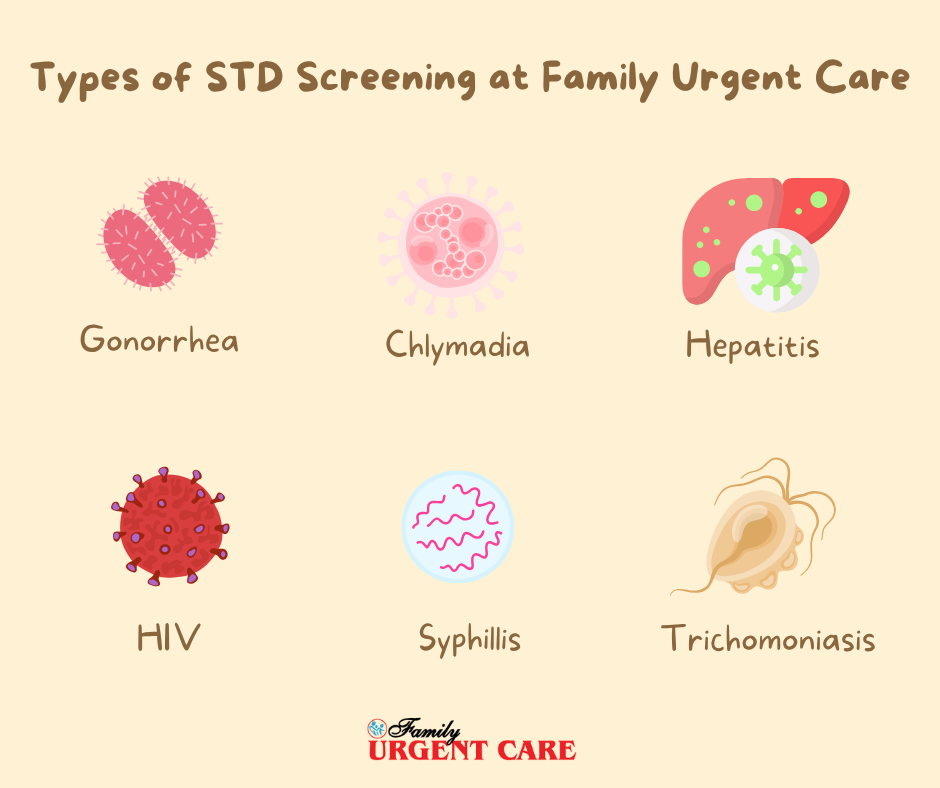Get Accurate STD Testing Or Screening At Family Urgent Care
You might be concerned about noticing unusual symptoms such as unusual discharge from the vagina or penis, itchy genitals, blisters or sores, or a rash.
If you experience any of the concerning symptoms leading to STD or STI, you can get expert medical care by visiting Family Urgent Care.
Our experienced team of healthcare providers and board-certified medical experts is here to provide confidential and compassionate care.
Read More: Can You Get STD Testing at Urgent Care?
Types Of STD Testing Available At Urgent Care Clinic
You do not need to commute to other lab facilities as we provide multiple lab and blood tests to detect all the common STDs or STIs. Some of the common STDs that we can test or screen for are:
- Gonorrhea: A bacterial infection that often causes burning during urination or discharge, but can also show no symptoms at all.
- Chlamydia: One of the most common STIs, often silent but can lead to serious complications if left untreated.
- Hepatitis B & C: These viruses affect the liver and can spread through blood, sharing needles, or sexual contact.
- HIV: A virus that weakens the immune system over time. Early testing can lead to effective treatment and management.
- Syphilis: A bacterial infection where early signs include sores, but it can become serious if untreated.

What Can You Expect During an STD Consultation At Family Urgent Care?
During your STD/STI consultation, our expert healthcare providers evaluate your symptoms and order some tests, depending on your clinical condition. These tests might include:
- Blood tests
- Urinalysis
- Swab test
- Oral test
- Lumbar puncture (rare)
Once you get your STD results, the doctor will review them and make an appropriate treatment plan to help you find relief and recover from the disease or infection.
When Should You Get an STD or STI Test?
You need to contact a doctor if you notice any unusual discharge, blister, sores or rash from or on your genitals, as there is a chance that you might have contracted a sexually transmitted disease.

Some more symptoms that you should watch out for and seek help for are as follows:
- Painful or burning sensation during peeing
- Pain during or after intercourse
- You have a fever (more than 100 F)
- You notice unusual vaginal bleeding (in women)
- Pain in both or one testicle (in men)
Remember that some STDs or STIs are asymptomatic, which means that you’ll experience no symptoms, so doctors recommend that all sexually active men and women get tested for STDs or STIs once every year.
Why Choose Family Urgent Care For STD Testing or Screening?
We are an all-in-one solution for seeking help with STDs or STIs, as we provide more than just lab testing facilities to our patients. Here’s how we are different from other service providers.
- Diagnosing STD/STI: You can get an accurate STD or STI diagnosis after you get your lab results.
- Provide Complete Treatment: Our experienced doctors devise a proper treatment plan that helps you recover from the disease.
- Book Video or Phone Appointments: You can consult our healthcare providers through follow-up appointments, either physically or online. The doctor can monitor your progress and listen to any concerns through phone or video appointments without the hassle of travelling to the clinic.
- Give Referrals: If you need specialized care or ongoing management, our doctors might refer you to specialists for further evaluation or treatment.
At Family Urgent Care, we’re here to make STD testing easy, private, and stress-free, so you can feel confident about your health. Whether you book ahead or walk in, we’ll take care of you.
FAQ's
If you are sexually active and have multiple sexual partners, new partners, or symptoms, it's a good idea to get tested at least once a year or even every 3 to 6 months.
No, STDs don’t spread through toilet seats. These infections require direct contact, usually sexual. Viruses and bacteria that cause STDs don’t survive long on surfaces like toilet seats.
Your STD test results depend on the test. Rapid results like HIV may come in 30 minutes. Others, like chlamydia or gonorrhea, may take 2–5 days. We’ll let you know exactly when to expect your results.

